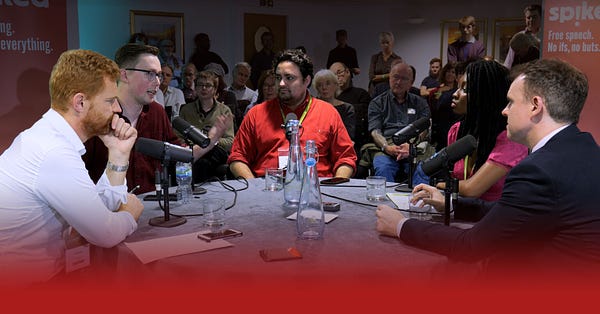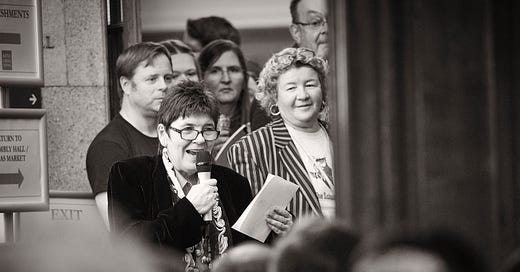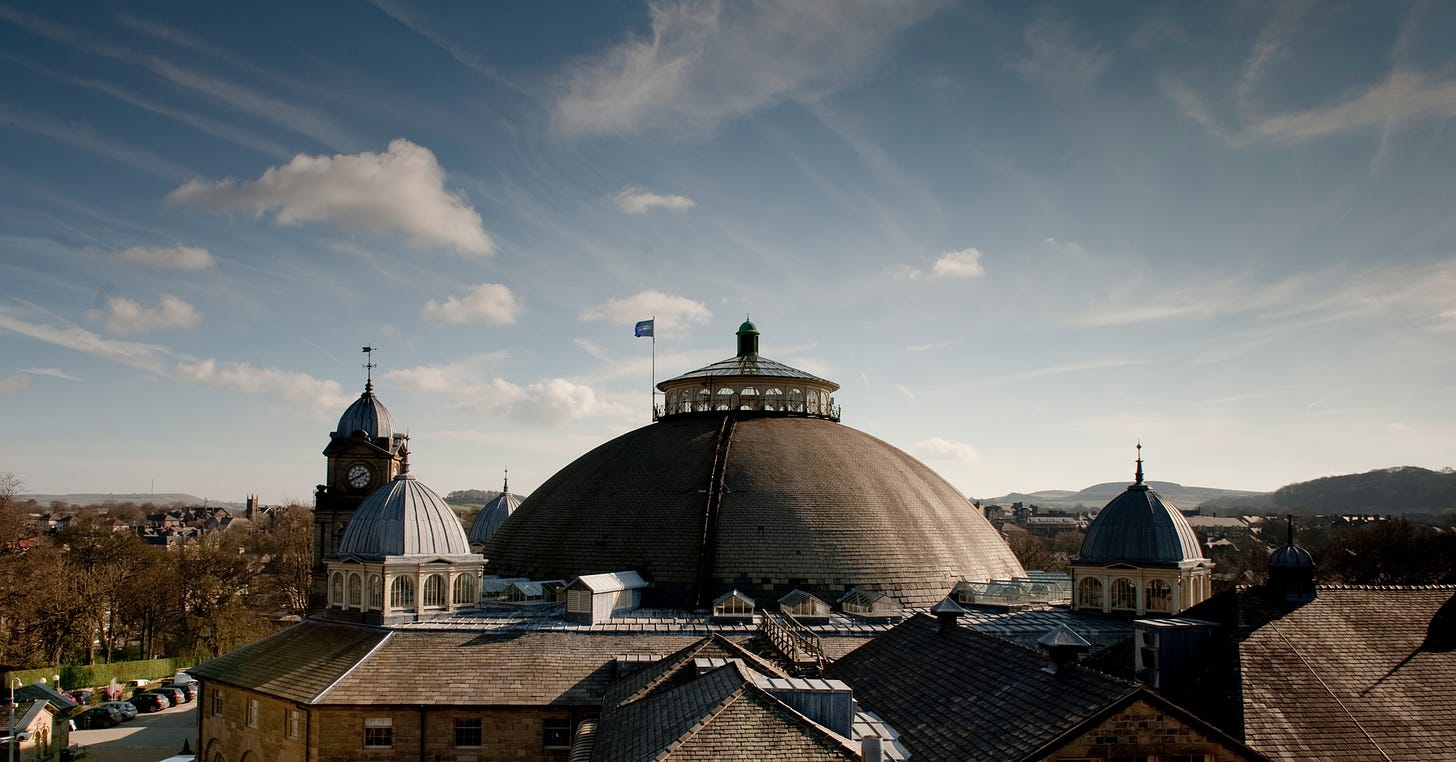Well, what a weekend that was! Despite official politics going into meltdown, grassroots political debate is alive and well, as evidenced when thousands piled into Church House at the weekend. We at the Academy of Ideas are all buzzing from an incredible Battle of Ideas festival.
We’ll have much more to say on this soon (and releasing podcasts and videos from many of the sessions), but I wanted to let you know about a few highlights you can dig into right now - and to let you know that the Battle continues: our next event, the Buxton Battle of Ideas festival is on Saturday 5th November at the Devonshire Dome in Buxton. Watch out for more events in the weeks ahead in Berlin, Stockholm - see here - and Liverpool and Glasgow – see here. But first up, I am chairing a panel on Is it becoming impossible to be contrarian? on Wednesday evening in London.
The best way of keeping in touch with our work is to sign up to our Substack, and to our podcast, and to encourage others to join our ever-growing community of free thinkers.
Read on for video from Andrew Doyle’s Free Speech Nation (courtesy of one of the festival’s partners GB News), the Spiked Podcast Live, and for one of my highlight speeches of the whole festival from journalist Bruno Waterfield which we are delighted to share with you - here’s a short quote from it and read the whole thing below:
“Life is a struggle. There is darkness. There is evil. We all have a duty to be brave enough to struggle on ourselves, sure, but most importantly to have the courage to reach out a hand to others, to hold on to the principle that life is worth the fight.”
Bruno Waterfield
Andrew Doyle’s Free Speech Nation
We were delighted to welcome back Andrew Doyle to the festival to, among other things, film another episode of his fab GB News show Free Speech Nation. You can watch it right now. It was a brilliant example of how best to defend free speech with intellect, humour and grace. It was a pleasure to partner with GB News to make this happen, and we thank them for all their support.
Spiked Podcast
We were also really pleased that our friends at Spiked came to record the brilliant Spiked Podcast in front of our Battle of Ideas festival audience, with Tom and Fraser from Spiked along with Inaya Folarin Iman, Paul Embery and (again) Andrew Doyle. Spiked writers have always featured at the festival and we were delighted the team brought the podcast to this year’s event. Do check it out!


A call to courage
The Battle of Ideas festival ended with a panel I chaired, titled A Call to Courage: Winning the Battle of Ideas. One of our panellists, Bruno Waterfield of The Times, gave a brilliant speech which left few dry eyes in the house. I am delighted that Bruno has agreed to let us share it with you.
Her name was Shanti De Corte.
Shanti was at the departures area of Brussels airport on 22 March 2016 when Islamic State suicide bombers struck. She and other classmates, aged 16 to 17, were on their way to Rome to celebrate the end of exams at school. The bombers killed 14 people, who died in the blast. Shanti was lucky. She was close by, but survived.
Six months later, she was diagnosed with severe post-traumatic stress disorder and depression. Haunted by the horrors of that day, she spoke of her crushing sense of guilt at trying to flee, leaving her friends as the airport ceiling crashed down on her. She was open about her struggle and made a suicide attempt a year after the bombing.
On 7 May this year, aged just 23 - 23! - Shanti died. She was given, at her request, a lethal injection in an Antwerp hospital on the grounds (defined by two psychiatrists) of unbearable psychological suffering caused by untreatable depression. This is legal under Belgium’s euthanasia legislation. Her case has only emerged in recent days because of concerns raised by one doctor who had offered her treatment rather than death.
I tell this story not to criticise or slight Shanti. Her death is a tragedy. But as a lesson, a cautionary tale, her tale reveals the defeatism, bordering on nihilism, that is prevalent in many European societies.
This was a young woman with her life ahead of her. It is the duty and obligation of all of us to fight for life, to help people - especially for those in authority with responsibilities for the welfare of the vulnerable.
If you were walking across a high bridge and you saw a distressed young woman standing outside the railings about to jump, what would you do? Would you ask her if she needed a hand and then push her off? Or would you hold on to her tight, calling to other passers-by to come and help?
Shanti’s death tells us how little in Western societies we are ready to fight. In terms of at least one life, Belgium finished the work of those suicide bombers by giving up on the struggle to give Shanti a future. After what she saw that day, surely society had, if anything, a special duty to her?
Her case raises questions beyond her own or any individual’s survival. These are questions for all of us. This act of resignation, of defeatism - to paraphrase Sartre - is society’s will for everyone, an action that is a commitment on behalf of all mankind.
Defeatism is the very opposite of courage. It is to turn tail from struggle because of an outlook and ideology that diminishes, even stigmatises, people’s capacity to fight for a future. She was young and it was time to fight. She faltered. Society acted on her behalf with an irrevocable surrender.
Life is a struggle. There is darkness. There is evil. We all have a duty to be brave enough to struggle on ourselves, sure, but most importantly to have the courage to reach out a hand to others, to hold on to the principle that all lives are worth a fight. Some things are worth fighting for - always and forever, especially at the darkest hours before dawn can come. Shanti’s tragic death tells us that many do not grasp this.
Courage is more than bravery. It takes us beyond ourselves to defy fate, to resist what the so-called realists, (or psychiatrists), tell us is inevitable. It pushes us into a world of principle, of free speech, equality, justice, and solidarity, the obligation to help weaker people, not to walk on by.
Take patriotism. Our societies stigmatise patriotism because it directly confronts a dominant culture of defeatism. It is a declaration that something - our country, our communities, our territory, our borders, our people - is worth fighting for.
Courage is not passive. It is not courage to be sacrificed, for example, as a pawn on the killing fields of the First World War. Courage is the active, volunteer spirit of defying the odds, to take a stand, to fight for our world.
History is this virtue, the refusal of people now and generations before us to bow to fate or defeatism. Or else it would have been the dark ages forever. We make history, all people. Yes, of course, in circumstances not of our making, often in situations of struggle and adversity. Even of war as we see in Ukraine.
Courage, as Hannah Arendt put it, is to leave the protective security of our four walls at home to enter a new realm of struggle, of politics. This takes us outside of the routines of everyday life and gives us new horizons beyond our daily work or life. She wrote: “Courage is indispensable because in politics… the world is at stake.”
Courage is when we live for the world. That is the impulse that makes history and that should guide our lives. As Churchill said: “Courage is the first of the human qualities because it is the quality which guarantees all others.”
With courage we can take a stand against the weight of circumstance or the juggernauts of realism and orthodoxy.
It is our duty to defy defeatism if we want to preserve or improve our world, our freedom, or solidarity. All human qualities, all virtues, are guaranteed by courage, by our refusal to bow, to get on our knees. or go into the night without a fight.
Buxton Battle of Ideas festival
There is no better opportunity to show some of that courage than to join us in Buxton to argue about the future of society!
Saturday 5 November · 10.00am – 6.00pm
Devonshire Dome, 1 Devonshire Road, Buxton, SK17 6RY
A day of debate on politics, economics, philosophy and more at The Devonshire Dome as the Battle of Ideas festival returns to Buxton!
Join us at this stunning venue in the spa town of Buxton, in the heart of the Peak District in Derbyshire. An opportunity to get to grips with some major public debates and the challenges we face going forwards, covering politics, economics and our wider culture.
Produced by the Academy of Ideas with headline partner the University of Derby.
PROGRAMME AND SPEAKERS
10.30
Welcome address
Claire Fox
10.45 – 12.15
Opening plenary: Can we fix Britain?
William Clouston
Edwina Currie
Dr Mo Lovatt
Hilary Salt
James Woudhuysen
12.15 – 13.30
Lunch & Ideas Market
12.30 – 13.15
Lunchtime Inspirations
Letters on Liberty: Defending the digital self
Tracey Follows
Nicholas Joseph
Timandra Harkness
Rob LyonsLetters on Liberty: The liberating power of education
Harley Richardson
Dr Ruth Mieschbuehler
Dr Adam Simcock
Dr Vanessa Pupavac
13.30 – 14.45
Politically homeless? What next for Red Wall voters?
Dr Mo Lovatt
Rick Moore
Graham Stringer MP
Hilary Salt
Sherelle JacobsFree speech in crisis: can we take a joke?
Nick Dixon
Tania Edwards
Timandra Harkness
Andy Shaw
Barry WallFrom grooming gangs to child protection: a scandal in plain sight?
Susie Hawkes
Dr Ken McLaughlin
Jordan Tyldesley
Wasiq Wasiq
14.55 – 16.10
Climate emergency: catastrophe or catastrophising?
Simon Cooke
Dr Caspar Hewett
Laurie Laybourn
Austin WilliamsCop Out: Who do the police serve today?
Speakers include
Harry Miller
Graham WettoneOnline politics: people power or social-media cesspit?
Tracey Follows
Sam Parker
Jacob Reynolds
Reverend Calvin Robinson
16.10 – 16.30
Afternoon refreshments
16.30 – 17.45
Closing plenary: Call to courage: is anything worth fighting for?
Claire Fox
Dennis Hayes
Marion Calder
Alan Miller
Charlie Winstanley





